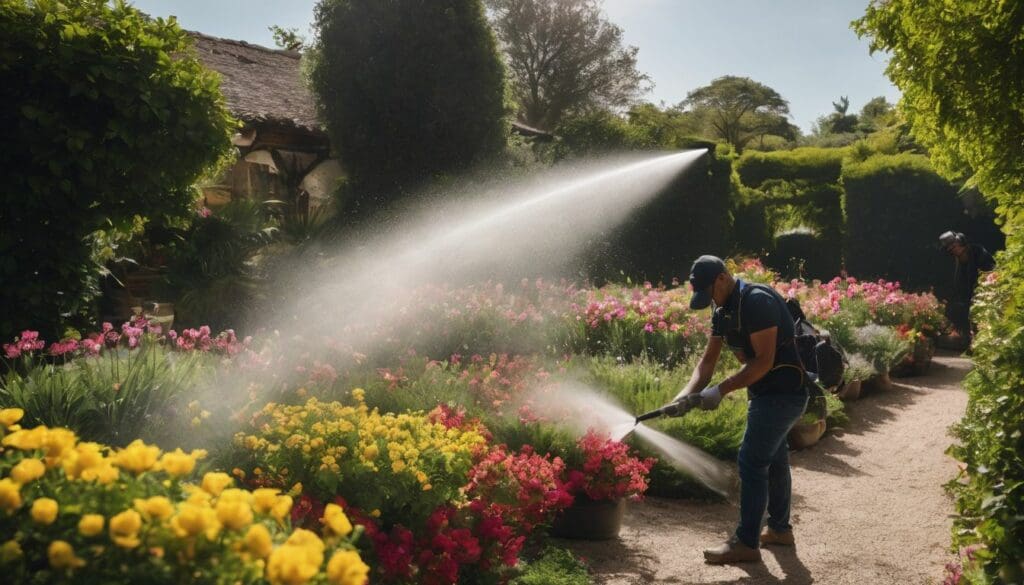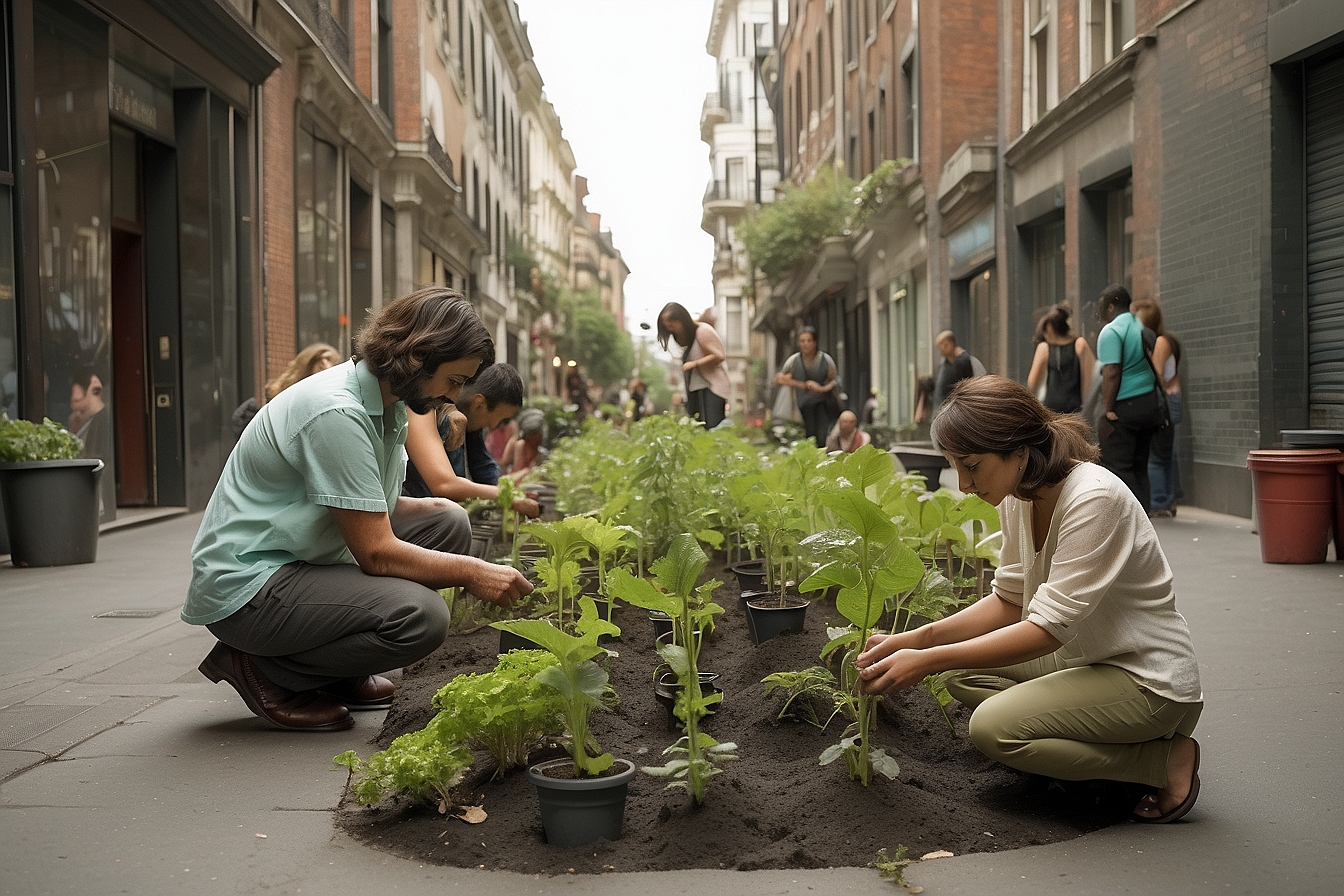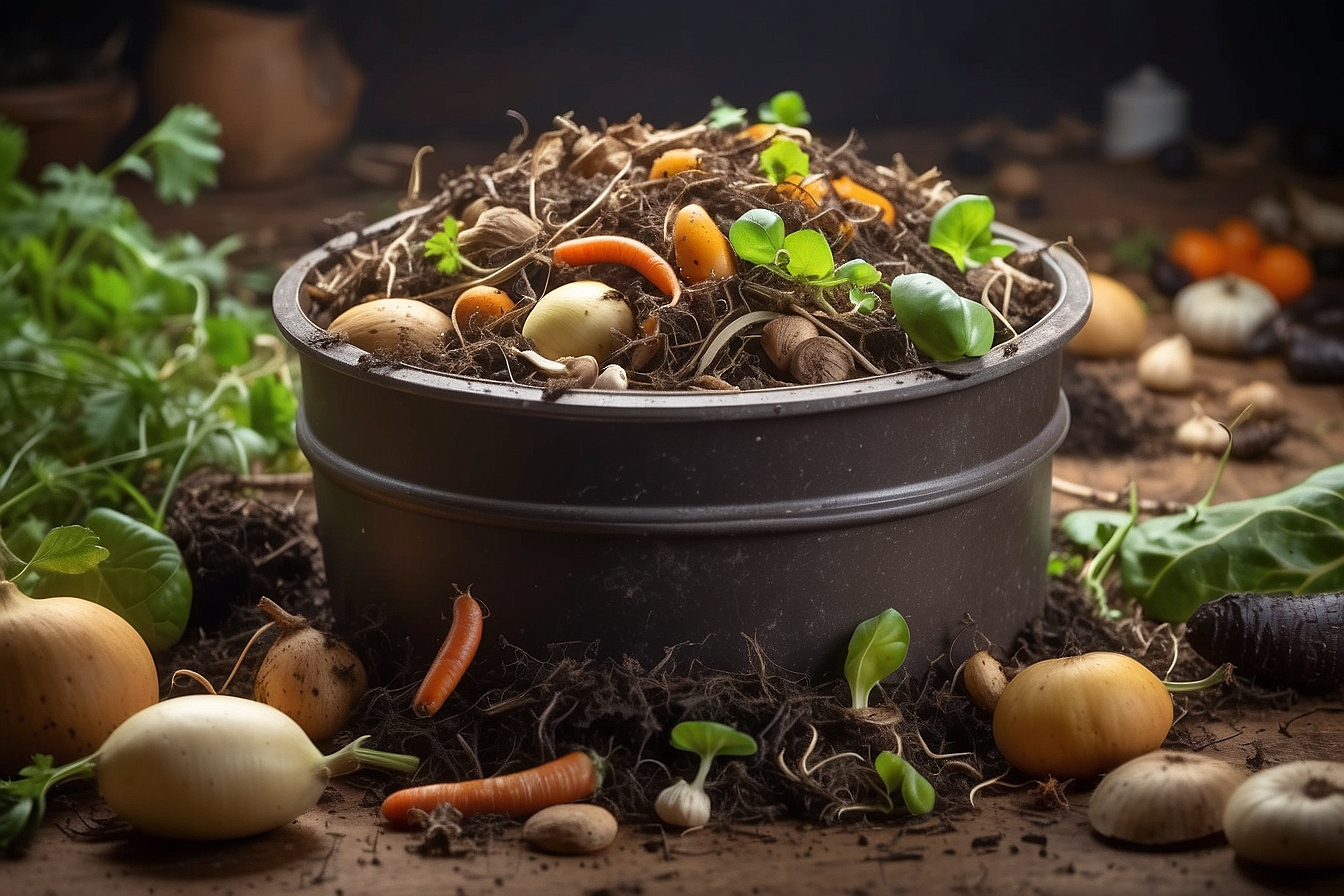Ah, that all-too-familiar scene – peering out to your cherished garden only to find it’s turned into an open diner for a host of uninvited guests. It’s rather disheartening, isn’t it? Rest assured, you’re in good company.
Many of us green thumbs have faced such tribulations and I’m happy to report that nature-friendly ways of dealing with these pesky intruders can be both gentle on our earth and remarkably effective.
In this little corner of the internet we call our blog, we’ll unveil some tried and true tactics for safeguarding your precious greens whilst staying true to eco-conscious principles.
So roll up your sleeves, and let’s dive into a spot of greener gardening wisdom together!
Key Takeaways
- Use natural pest control methods like neem oil spray and insecticidal soap to safely manage pests without harming the ecosystem.
- Introduce beneficial nematodes into the soil as a non-toxic way to deal with grubs, caterpillars, and other harmful insects underground.
- Reduce pesticide use by employing physical barriers such as floating row covers, which prevent bugs from reaching plants while still letting through light and water.
- Encourage helpful insects like ladybugs and lacewings by growing diverse plant species; these predators naturally keep pest populations in check.
- If DIY eco – friendly measures don’t work, consult professional pest control services that specialise in green solutions for a targeted approach.
Understanding the Importance of Eco-Friendly Pest Control in the Garden
Having explored the basics, let’s delve into why eco-friendly pest control is crucial for our gardens. Adopting green gardening practices not only protects the ecosystem but also ensures that we’re growing food and plants in a way that’s safe for both us and wildlife.
Chemical-free pest control preserves soil health, preventing harmful substances from leaching into water sources which keeps aquatic life safe as well.
We recognise that insects play vital roles in pollination and decomposition, so it’s essential to engage in environmentally friendly pest management that supports these beneficial creatures while curbing the pesky ones.
By choosing natural pest control methods, we contribute positively to biodiversity conservation and promote sustainable gardening models that future generations can follow with confidence.
Organic Pest Control Methods That Actually Work
Here are some effective organic pest control methods for your garden. Floating row covers can act as physical barriers to keep pests away, while insecticidal soap and neem oil spray are great natural options for controlling soft-bodied insects.
Additionally, beneficial nematodes, hand-picking bugs, and diatomaceous earth can also help manage pests in an eco-friendly way.
Floating row covers for physical pest barriers
Floating row covers provide a physical barrier that protects plants from pests while allowing air, light, and moisture to reach them. These covers are made of lightweight fabric and can be placed directly over crops or supported by hoops.
They effectively keep out insects like aphids, flea beetles, and caterpillars without the need for chemical pesticides. This eco-friendly method is an excellent way to safeguard your garden plants against pests while maintaining a natural balance in the environment.
By using floating row covers as physical pest barriers in our gardens, we can reduce the reliance on chemical pesticides, supporting eco-conscious pest control techniques. These nontoxic methods contribute towards sustainable gardening practices that are beneficial for both the environment and our overall well-being.
Insecticidal soap for soft-bodied insects
Transitioning from physical pest barriers to a natural pesticide, insecticidal soap is an effective solution for controlling soft-bodied insects in your garden. Made from natural plant oils and fatty acids, this eco-friendly pesticide targets aphids, mealybugs, spider mites, and other pests without harming beneficial insects.
When applied directly to the pests, the soap works by suffocating them and disrupting their cell membranes. To use insecticidal soap effectively, ensure thorough coverage of the affected plants while avoiding applications during hot or sunny conditions as it may cause damage to leaves.
Insecticidal soap serves as an environmentally friendly alternative to chemical pesticides, offering a non-toxic method for managing garden pests. It can be part of an integrated pest management approach that supports the conservation of beneficial insects while effectively controlling harmful ones in your organic garden.
Neem oil spray as a broad-spectrum insecticide
Neem oil spray acts as a powerful broad-spectrum insecticide, effectively controlling a wide range of garden pests naturally. It targets aphids, mites, whiteflies, caterpillars and other common garden invaders without harming beneficial insects.
This eco-friendly pesticide is derived from the seeds of the neem tree and works by disrupting the lifecycle of pests at various stages. When sprayed on plants, it creates an inhospitable environment for insects while also acting as a repellent.
Its versatility and low environmental impact make it an ideal choice for those seeking natural and sustainable pest control solutions in their gardens.
Beneficial nematodes for natural pest control
Beneficial nematodes are microscopic roundworms that can be applied to the soil to control a variety of garden pests, including fleas, grubs, and caterpillars. Once introduced into the soil, they seek out their target pests and release bacteria that kill them.
These beneficial nematodes are safe for plants, pets, and people, making them an eco-friendly alternative to chemical pesticides. By using beneficial nematodes in your garden, you can effectively manage pest populations while maintaining a healthy and natural environment.
Additionally,natural pest control methods like introducing beneficial nematodes contribute to sustainable gardening practices and help protect the delicate balance of ecosystems. Remember that incorporating these eco-friendly solutions not only benefits your garden but also supports conservation efforts by reducing reliance on chemical treatments.
Hand-picking bugs to remove them manually
We remove pests by hand, carefully picking them off leaves and stems. This method is effective for larger insects like caterpillars or beetles. To avoid damaging the plant, we inspect both sides of the leaves regularly.
When checking for pests, wear gloves to protect your skin. Drop the bugs into a bucket of soapy water – this will drown and kill them humanely without using harmful chemicals. Regularly tidying the garden in this way helps maintain a healthy balance without causing harm to other beneficial insects such as ladybugs or earthworms.
Diatomaceous earth for a non-toxic pest deterrent
Transitioning from hand-picking bugs to remove them manually, another effective non-toxic method for pest control in the garden is diatomaceous earth. This natural substance, made from fossilised remains of tiny aquatic organisms called diatoms, is an environmentally friendly way to manage pests without harmful chemicals.
Diatomaceous earth works by physically damaging the exoskeletons of insects, causing them to dehydrate and die. It can be sprinkled around plants or directly on pests to create a barrier that effectively controls slugs, beetles, ants, and other crawling insects without harming beneficial wildlife.
When applying diatomaceous earth in the garden, remember to reapply after rain as it loses its effectiveness when wet. Additionally, ensure even distribution and avoid excessive exposure to helpful insect populations such as bees and butterflies.
When to Seek Professional Help for Pest Control
If your eco-friendly pest control methods haven’t effectively managed the pest population, it may be time to consider seeking professional help. Professional pest control services can offer expertise in identifying and treating persistent pest problems while still adhering to environmentally friendly practices.
When natural remedies and DIY solutions are not achieving the desired results, consulting with a professional can provide targeted and effective strategies without compromising your commitment to sustainable gardening practices.
Moreover, when facing an infestation that poses a threat to the health of your garden or demonstrates resistance to organic treatments, enlisting the assistance of a professional ensures that the issue is addressed comprehensively.
By collaborating with experts in eco-conscious pest management techniques, you can find tailored solutions for maintaining a healthy and thriving garden ecosystem while safeguarding the environment from harmful chemicals.
Why Organic Gardening is Better for the Environment
Reducing pesticide use is essential for protecting the environment and promoting the wellbeing of ecosystems. By supporting beneficial insects and maintaining a natural balance in the garden, organic gardening helps to create a sustainable and wildlife-friendly environment.
Reducing pesticide use
We can reduce pesticide use by implementing eco-friendly pest control methods such as using natural predators like ladybugs and lacewings to keep harmful insect populations in check.
Planting diverse crops and rotating them annually helps break the life cycles of pests, reducing the need for chemical intervention. Additionally, encouraging beneficial insects like bees and butterflies through the use of native plants helps create a balanced ecosystem that naturally controls pest populations.
Employing physical barriers such as row covers and sticky traps deters pests without resorting to harmful chemicals. Furthermore, practicing good garden hygiene by removing diseased plants promptly reduces the risk of infestations, making it easier to manage without relying on pesticides.
Supporting beneficial insects
Support beneficial insects by planting a variety of native flowers, shrubs, and trees in your garden to provide food and shelter. This will attract pollinators like bees and butterflies as well as predatory insects such as ladybirds and lacewings that feed on harmful pests.
Avoid using broad-spectrum pesticides which can harm both beneficial and harmful insects alike. Instead, opt for targeted organic pest control methods to encourage the presence of these helpful creatures in your garden.
Create habitats for beneficial insects by leaving some areas of the garden undisturbed. This could include leaving leaf litter or providing small piles of rocks where they can take refuge.
Maintaining a natural balance
Supporting beneficial insects in your garden is essential for maintaining a natural balance. By avoiding chemical pesticides and opting for natural pest control methods, you can create a welcoming environment for these helpful creatures.
Encouraging biodiversity and embracing eco-friendly pest control solutions will promote a healthy ecosystem within your garden.
Paying attention to the delicate balance of nature ensures that all elements of your garden work together harmoniously. Implementing sustainable pest control techniques not only supports the well-being of your plants but also contributes to the overall health of the environment.
Conclusion
It’s essential to take an eco-friendly approach to pest control in the garden, not only for the health of your plants but also for the wellbeing of the environment. By using natural and non-toxic methods, we can effectively manage pests while supporting a balanced ecosystem.
Join us in promoting sustainable and earth-friendly pest control solutions.
Importance of taking an eco-friendly approach
We must prioritise taking an eco-friendly approach in pest control to protect our environment. Embracing organic and chemical-free methods not only safeguards the health of our garden but also preserves the balance of nature.
By reducing pesticide use, supporting beneficial insects, and maintaining a natural ecosystem, we contribute to a healthier and more sustainable environment for all living organisms.
Choosing eco-conscious pest control solutions empowers us to make a positive impact on wildlife while creating a safer space for ourselves and future generations. Opting for nontoxic pest control methods demonstrates our commitment to environmentally friendly practices, promoting the well-being of our planet and its inhabitants.
Resources for further reading
For those looking to delve deeper into eco-friendly pest control practices, there are several valuable resources available. “The Organic Gardener’s Handbook of Natural Pest and Disease Control” by Fern Marshall Bradley provides comprehensive insights into chemical-free gardening methods for managing pests effectively.
Additionally, “Rodale’s Basic Organic Gardening” by Deborah L. Martin offers practical guidance on creating a wildlife-friendly garden that encourages natural pest control. For individuals interested in homemade pest control solutions, websites such as EarthEasy and the National Pesticide Information Center provide useful information on DIY pest control and eco-conscious pest management techniques.
Supporting conservation through sustainable pest control can also be further explored through online platforms like the Xerces Society for Invertebrate Conservation, which offers detailed resources on supporting beneficial insects for environmentally friendly insect control in gardens.
Encouraging others to join the movement.
After learning about the benefits of eco-friendly pest control and organic gardening practices, it’s time to spread the word and encourage others to join the movement. By implementing sustainable pest control methods in our gardens, we can minimise harm to the environment while creating a healthy habitat for beneficial insects.
Let’s work together to support conservation efforts and promote nontoxic methods for pest control in our community.
By sharing our knowledge and experiences with fellow gardeners, we can inspire others to adopt earth-friendly pest management techniques. It’s essential to engage in conversations about chemical-free gardening and wildlife-friendly pest control, empowering individuals to make informed choices that contribute positively to the environment.
FAQs
1. What is eco-friendly pest control in the garden?
Eco-friendly pest control in the garden means using natural and organic ways to treat pests without harming the environment.
2. Are there any chemical-free pest control options for my garden?
Yes, there are many chemical-free gardening methods, such as introducing beneficial insects or using homemade solutions to manage pests safely.
3. Why should I consider eco-conscious pest control solutions?
Choosing eco-conscious pest control helps protect wildlife and keeps your garden healthy without relying on harmful chemicals.
4. Can I still have effective pest management with earth-friendly techniques?
Absolutely! Employing earth-friendly pest management techniques like companion planting can effectively deter pests while being sustainable for gardens.
5. How can I practice wildlifefriendly pest control in my garden?
To maintain wildlife-friendly conditions, opt for green pest control methods that don’t harm beneficial creatures living around your plants.





